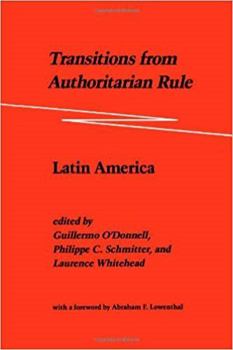Transitions from Authoritarian Rule: Latin America
Select Format
Select Condition 
Book Overview
An array of internationally noted scholars examines the process of democratization in southern Europe and Latin America. They provide new interpretations of both current and historical efforts of nations to end periods of authoritarian rule and to initiate transition to democracy, efforts that have met with widely varying degrees of success and failure. Extensive case studies of individual countries, a comparative overview, and a synthesis conclusions...
Format:Paperback
Language:English
ISBN:0801831881
ISBN13:9780801831881
Release Date:September 1986
Publisher:Johns Hopkins University Press
Length:256 Pages
Weight:0.75 lbs.
Dimensions:0.7" x 6.1" x 9.2"
Grade Range:Postsecondary and higher
Customer Reviews
1 rating
Latin America as a Mirror of Other Developing Countries
Published by Thriftbooks.com User , 24 years ago
This book which is a collection of some writings edited by Guillermo O'Donnell, Philippe Schmitter, and Laurence Whitehead is published as the result of international meeting/conference titled `Transitions from Authoritarian Rule: Prospect of Democracy in Latin America and Southern Europe.' In fact, there are four books as the result of the conference. This book particularly took the Latin American case (Latin America's experience in democracy) as its main stress. By researching the differences of Latin America's domestic characterizations (either socio-political or historical) which, to some extent, opposed to Southern Europe's characterization, and the influence of international factors, some of the writers arrived at the same conclusion. The conclusion is that the prospect of political democracy in Latin America is not so bright, or at least worse than in Southern Europe. The differences are, first, the higher degree of military's interference in politics in Latin America than in Southern Europe. This fact made the transition projects more difficult, at least in two things, the possible existence of political revenge of the democratic regime to the former authoritarian regime and too many issues and institutions under military's control as the authoritarian regime was in power. Second, the comprehension of ideas of democracy is more ambiguous in Latin America than in Southern Europe. Political democracy is more understood as manifested in "left and populist parties" rather than in the accountably institutional order of representation and aggregation. Third, higher economic and educational inequality in Latin America, which is the heritage of the former authoritarian rule, than in Southern Europe. This fact marked the fragility of democratic regimes. If they fails to overcome this inequality, it is likely turning back to the authoritarian rule. Fourth, the absence of formally political pact in Latin American transition. This fact caused the inadequacy of cooperation among the political actors, which in turn brings about the deficiency of legitimacy of the democratic regimes. This Latin America's experience in democracy actually resembles the experience of other developing countries. Those factors mentioned above are also inherent in the developing countries. Thus, by reading this book we can, at least, get the picture of prospect of democracy in other developing countries.





